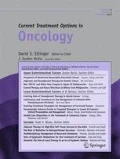Opinion statement
Symptom management of the actively treated elderly cancer patient represents an undertreated and disproportionately understudied cohort in oncology. There is a dearth of specific recommendations or guidelines regarding drug selection, dosing, and side effects which account for changes in aging physiology, pharmacokinetics, and idiosynchratic reactions. In treating cardinal symptoms and clusters of symptoms including pain, constipation, fatigue/weakness, nausea/vomiting, mucositis/xerostomia, and nutritional depletion syndromes such as malabsorption and anorexia/cachexia, most clinicians base their therapeutic decisions on individual experience. Depending on relative interest and level of competency, symptom management is often narrow in scope, frequently ineffective, and not based on evidence. We discuss these issues in a practical format, by surveying and comparing available core literature to the extent that it readily exists and by incorporating our own experiences.
Similar content being viewed by others
References and Recommended Reading
Aapro M, Macciocchi A, Gridelli C. Palonosetron improves prevention of chemotherapy-induced nausea and vomiting in elderly patients. J Support Oncol 2005; 3(5):369–374
Horiot JC, Aapro M. Treatment implications for radiation-induced nausea and vomiting in specific patient groups. Euro J Cancer 2004; 40(7):979–987. doi:10.1016/j.ejca.2003.12.023
Esbensen BA, Osterlind K, Hallberg IR. Quality of life of elderly persons with cancer: A 6-month follow-up. Scand J Caring Sci 2007; 21(2):178–190. doi:10.1111/j.1471-6712.2007.00454.x
Clark PM. Pharmacologic pain management in the elderly cancer patient. 2001. www.medscape.com/viewarticle/418569
Bernabei R, Gambassi G, Lapane K, et al. Management of pain in elderly patients with cancer. JAMA 1998; 279(23):1877–1882. doi:10.1001/jama.279.23.1877
Delgado-Guay MO, Bruera E. Management of pain in the older person with cancer. Part 1 Oncol 2008, 22(1):56–61; Part 2 Oncol 2008, 22(2):148–152
Vigano A, Bruera E, Suarez-Almazor ME. Age, pain intensity, and opioid dose in patients with advanced cancer. Cancer 1998, 83:1244–1250. doi:10.1002/(SICI)1097-0142(19980915)83:6<1244::AID-CNCR26>3.0.CO;2-4
Van den Beuken-van Everdingen MHJ, de Riike JM, et al. Prevalence of pain in patients with cancer: A systematic review of the past 40 years. Annal Oncol 2007; 18(9):1437–1449
Constipation in Cancer Patients. http://members.optusnet.com.au/-vchan/constipation.htm
Assessing and Managing Narcotic-Induced Constipation. Cancer Contr J Moffitt Cancer Center. www.medscape.com/viewarticle/417707_8
Portenoy RK. Cancer-related fatigue: an immense problem. Oncologist 2000; 5(5):350–352. doi:10.1634/theoncologist.5-5-350
Rao A, Cohen HJ. Symptom management in elderly cancer patient: fatigue, pain, and depression. J Nat Cancer Inst Monogr 2004; 32:150–157. doi:10.1093/jncimonographs/lgh031
Tumor-Induced Effects on Nutritional Status. National Cancer Institute. www.cancer.gov/cancertopics/pdq/supportivecare/nutrition/HealthProfessionals/page3
Zagaria, MAE. Nutrition in the elderly. US Pharmacist A Jocobson Publication. www.uspharmacist.com
Paillaud E, Caillet P, Campillo B, et al. Increased risk of alteration of nutritional status in hospitalized elderly patients with advanced cancer. J Nutrit Health Aging 2006; 10(2):91–95
Barber MD, Ross JA, Voss AC, et al. The effect of an oral nutritional supplement enriched with fish oil on weight-loss in patients with pancreatic cancer. Brit J Cancer 1999; 81(1): 80–86. doi:10.1038/sj.bjc.6690654
Argiles JM, Lopez-Soriano FJ, Busquets S. Novel approaches to the treatment of cachexia. Drug Discov Today 2008; 13(1/2): 73–77. doi:10.1016/j.drudis.2007.10.008
Murphy B. Clinical and economic consequences of mucositis induced by chemotherapy and/or radiation therapy. J Support Oncol 2007; 5(9): 13–21
Sonis ST. Oral mucositis in cancer therapy. J Support Oncol 2004; 2(3):3–8
Barasch A, Peterson DE. Risk factors for ulcerative oral mucositis in cancer patients: unanswered questions. Oral Oncol 2003; 39(2): 91–100. doi:10.1016/S1368-8375(02)00033-7
Koestler WJ, Hejna M, Wenzel C, et al. Oral mucositis complicating chemotherapy and/or radiotherapy: options for prevention and treatment. CA: A Cancer J Clin 2001; 51: 290–315
Elting LS, Cooksley C, Chambers M, et al. The burdens of cancer therapy: clinical and economic outcomes of chemotherapy-induced mucositis. Cancer 2003; 98:1531–1539. doi:10.1002/cncr.11671
Guidelines for the treatment of elderly cancer patients. Medscape Today for Web MD. www.medscape.com/viewarticle/465306-9
Rubenstein EB, Peterson DE, Schubert M, et al. Clinical practice guidelines for the prevention and treatment of cancer therapy-induced oral and gastrointestinal mucositis. Cancer 2004; 100(9): 2026–2046. doi:10.1002/cncr.20163
DiGangi P. Polypharmacy in older adults. Contemp Oral Hygiene Feb 2006. www.contemporaryoralhygieneonline.com/issues/articles/2006-02-03.asp
Papas AS, Clark RE, et al. A prospective randomized trial for the prevention of mucositis in patients undergoing bone marrow transplant. Bone Marrow Trans 2003; 31(8): 705–712. doi:10.1038/sj.bmt.1703870
Gridelli C. Same old story? Do we need to modify our supportive care treatment of elderly cancer patients? Focus on antiemetics. Drug Aging 2004; 21(13): 825–832. doi:10.2165/00002512-200421130-00001
Aapro M, Johnson J. Chemotherapy-induced emesis in elderly cancer patients: The role of 5-HT3-receptor antagonists in the first 24 hours. Gerontology 2005; 51(1): 287–296. doi:10.1159/000086364
Aapro M. Optimising antiemetic therapy: what are the problems and how can they be overcome?. Curr Med Res Opin 2005; 21(6): 885–897. doi:10.1185/030079905X46313
Author information
Authors and Affiliations
Corresponding author
Additional information
Communicated by Stuart Lichtman.
Rights and permissions
About this article
Cite this article
Barford, K.L., D’Olimpio, J.T. Symptom Management in Geriatric Oncology: Practical Treatment Considerations and Current Challenges. Curr. Treat. Options in Oncol. 9, 204–214 (2008). https://doi.org/10.1007/s11864-008-0062-4
Received:
Accepted:
Published:
Issue Date:
DOI: https://doi.org/10.1007/s11864-008-0062-4




